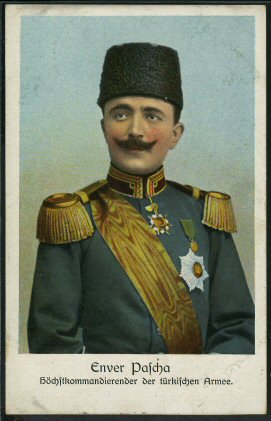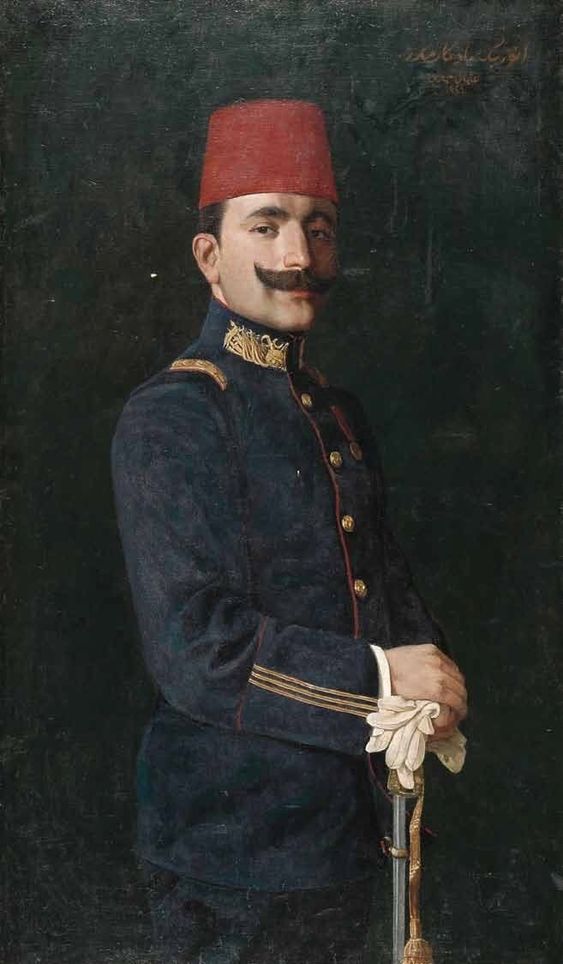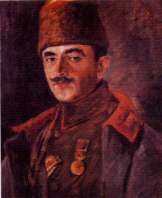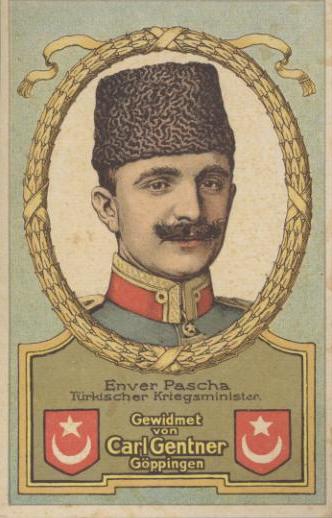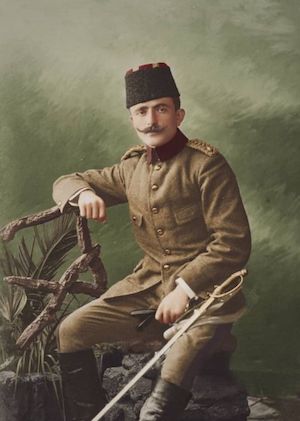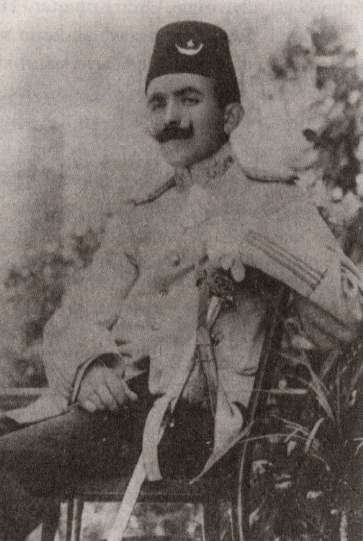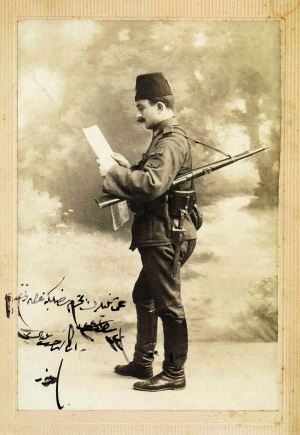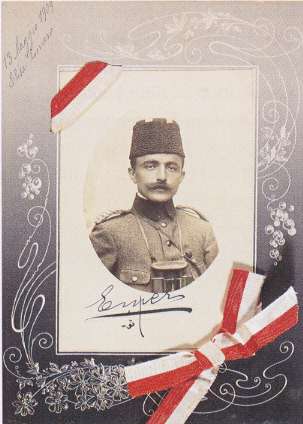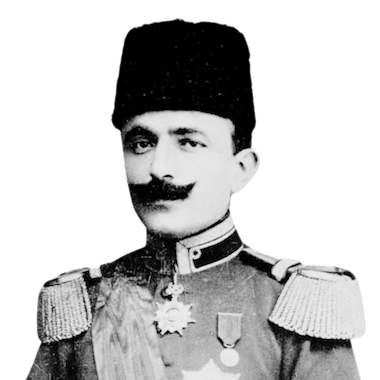 İsmail Enver was born on 23 November 1881 in Istanbul. He graduated from the military high-school in Monastir, where his family had moved to when he was six years old due to his father’s appointment, and he completed the War Academy in 1899. His political thinking began to be shaped when he was a student at the Staff School and there has been a case when he was taken to the Imperial Palace together with his uncle Halil, who was also a student, and interrogated because of his political opinions.
İsmail Enver was born on 23 November 1881 in Istanbul. He graduated from the military high-school in Monastir, where his family had moved to when he was six years old due to his father’s appointment, and he completed the War Academy in 1899. His political thinking began to be shaped when he was a student at the Staff School and there has been a case when he was taken to the Imperial Palace together with his uncle Halil, who was also a student, and interrogated because of his political opinions.
Enver graduated from the Staff School in 1902 at the rank of Captain. His first duty station was the Third Army in Macedonia, where he was appointed to the 13th Artillery Regiment in Monastir. He took active part in operations against Bulgarian bands and was later transferred to infantry regiments in the same region. On September 13, 1906, he was promoted to the rank of Major.
Meanwhile, in 1906 when he was in Salonica, founders of the Ottoman Liberty Association, which would later merge with the Committee of Union and Progress (CUP), invited Enver to join them, which he accepted, and gave him the task to establish a branch in Monastir. They were against the rule of Sultan Abdülhamit and their aim was to bring back the freedoms and having the Constitution brought back into effect. When news broke of King Edward and Tsar Nikolai meeting in Tallinn to share the territories of the Ottoman Empire, the CUP decided that it was time to take action.
A CUP-led revolution on its way and as a young officer Enver was to play a crucial role. When CUP decided to eliminate the Chief Commander in Salonica, Nazım Bey, he was the one to give the assassination order, although Nazım Bey was his brother-in-law. At the same time when another young officer, Niyazi Bey moved from Resne, Enver went to Tikveş and the revolution began on the mountains of Macedonia.
The constitutional regime was inaugurated on July 23, 1908. Realising the threat against his regime, Sultan Abdülhamit had no option but to give the CUP what it wanted. The Sultan reactivated the Parliament and Enver Bey returned to Salonica, where he was greeted as the “Hero of Liberty”.
Enver was sent to Berlin on March 5, 1909 as the Turkish military attaché in Germany. Soon after he went to Germany, on April 13, 1909, a counter-revolutionary uprising broke out in Istanbul organised by Muslim fundamentalists, unemployed officers and old regime functionaries. This uprising, known as the “March 31 Incident”, because the date of the incident corresponded to March 31, 1325 according to the calendar then in use in Ottoman Empire, was repressed by the “Liberation Army" led by Mahmut Şevket Pasha.
Mahmut Şevket’s troops marched on Istanbul and occupied the city on April 24, 1909. Sultan Abdülhamit was deposed and replaced by Sultan Mehmet V (Mehmet Reşad). The Constitution was amended to transfer real power to the Parliament; CUP and the army became the real arbiters of Turkish politics. Meanwhile Enver returned to Istanbul and replaced Mustafa Kemal Bey as the Chief of Staff of the Liberation Army.
When Italy invaded the Ottoman province of Trablusgarp (modern-day Libya), the Sublime Porte refrained from officially declaring war, however several Turkish officers went to Libya under cover, to organize the resistance against Italians. Enver was in charge of the Benghazi-Derne front, where he had been successful in stopping the Italian invaders. On June 10, 1912, he was promoted to the rank of Lieutenant Colonel, but soon afterwards, he would leave Libya, because another war had broken out in the Balkans. Turkey made peace with Italy, ending the war in Libya and withdrawing the “Twelve Islands” on the Aegean Sea to Italy.
Enver Bey came to Istanbul as the military situation was worsening for Turkey in the Balkans. An armistice was signed on December 3, 1912 and the Peace Conference began a fortnight later in London. Enver, who became the Chief of Staff of X Corps, was thinking that a new Cabinet should be formed and the war had to continue until the lost territories were recaptured. He tried to persuade the Sultan about this, but when it did not work, Enver carried out one of the most audacious acts of his career. On January 23, 1913, he and some CUP gunmen raided the Sublime Porte and forced the government to resign. The Minister of War, Nazım Pasha, was shot to death during the incident. The “Raid on the Sublime Porte” was a turning point for both Enver and the CUP. It marked the beginning of an era, when soldiers replaced the civilians at the top ranks of the party. A CUP-sympathizer, Mahmut Şevket Pasha, formed the new government.

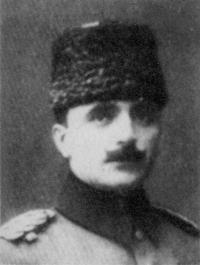
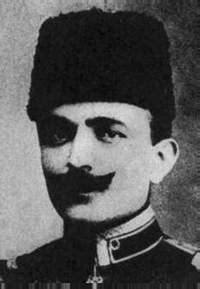
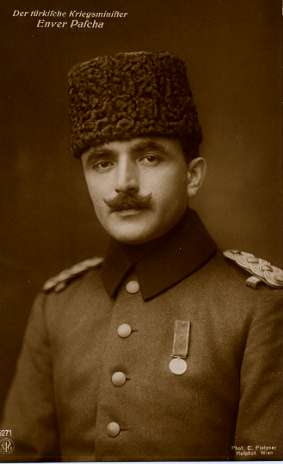
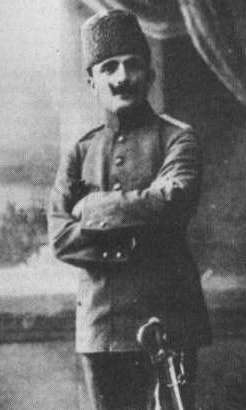
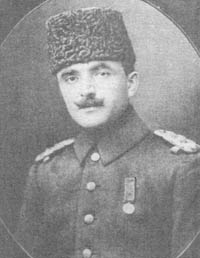

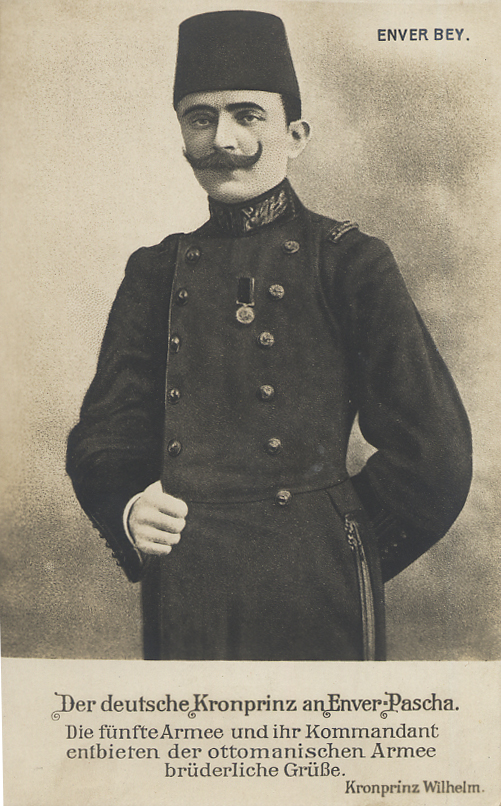

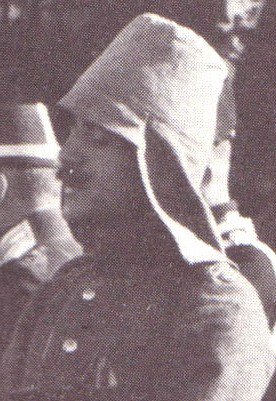
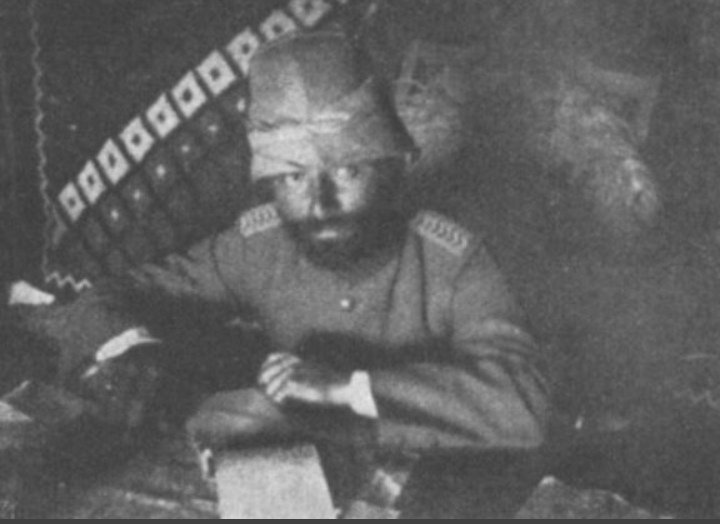

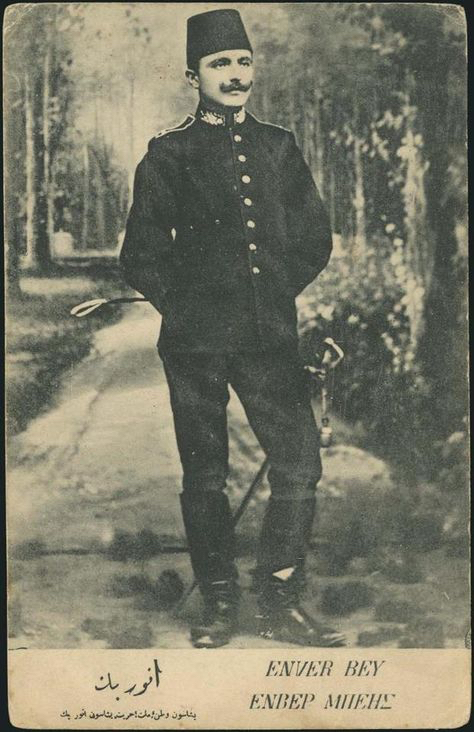
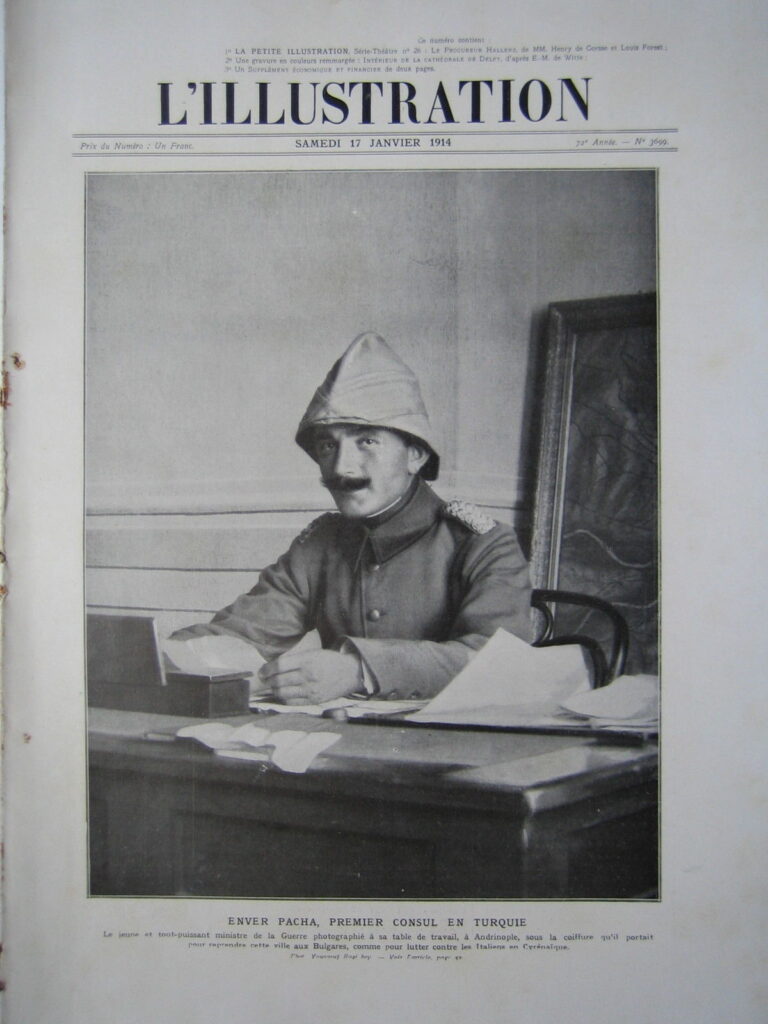
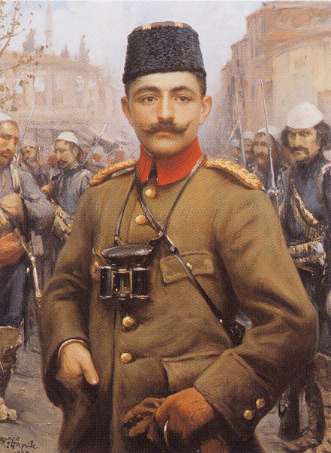
The First Balkan War ended with the Treaty of London signed on May 30, 1913, which had ejected Turkey from Europe with the exception of the Çatalca and the Gallipoli peninsula, drawing up boundary lines for Turkey and the Balkan States along the Midye-Enez line. However, the victors had conflicts with each other regarding the sharing of the territory gained in the war and the Second Balkan War began. Turkey used this opportunity to recover some lost ground and Edirne was recaptured on July 22, 1913. Enver Bey was leading the troops entering the former Ottoman capital.
The new Grand Vizier Said Halim Pasha, who took the office after the assassination of Mahmut Şevket Pasha, had formed his cabinet with Talat Bey, the de facto leader of the CUP as the Minister of Interior and Ahmet İzzet Pasha as the Minister of War. The CUP was considering replacing the latter, who was not deemed as a “man of struggle”. The two candidates were Enver and Cemal. Talat was supporting Enver, but he was worried about his greed. Cemal was also considered but the question was what to do with Enver if Cemal was appointed as the Minister of War.
Meanwhile, Enver was thinking that the army should be modernized and the cadres had to be rejuvenated and this could be only done with German support. One day he entered the office of the Grand Vizier and told him that nothing is done to modernize the army and therefore he should be appointed as the Minister of War. Said Halim Pasha said that he is too young to become a Minister but Enver insisted.
On December 18, 1913, he was promoted to the rank of Colonel, on January 5, 1914 he became a General and appointed as the Minister of War. Again, he got what he wanted. Two months later, on March 5, 1914, he married Naciye Sultan, a princess from the Ottoman Palace, consolidating his power at the top of the Turkish Army and the entire Empire.
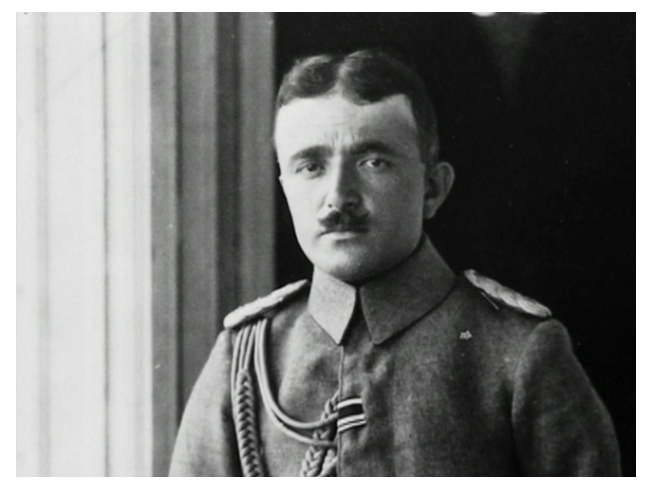
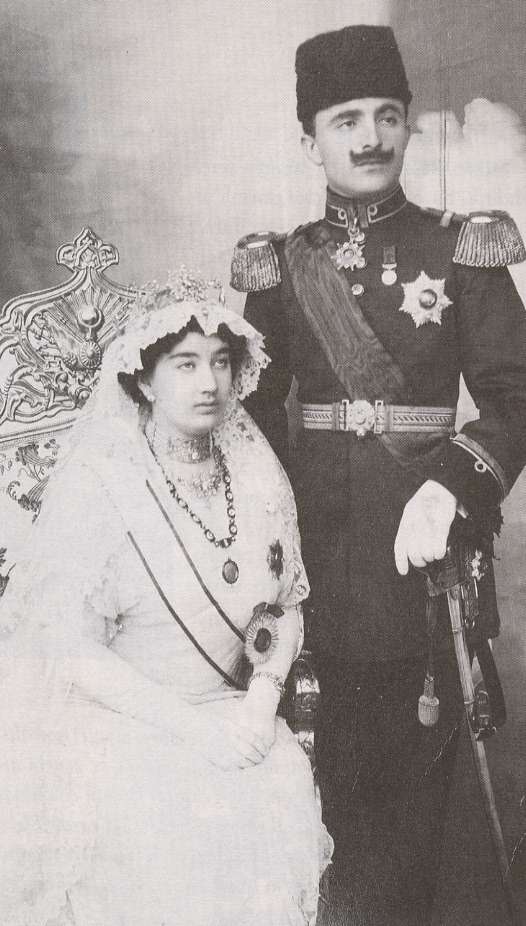



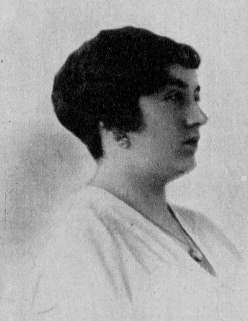
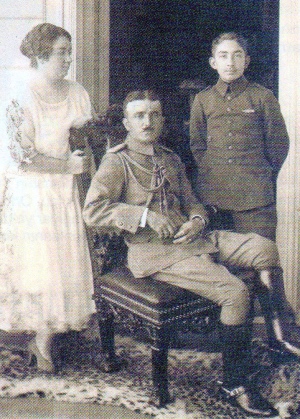
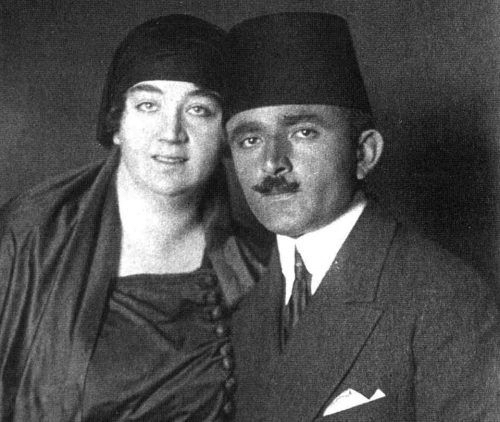

Enver Pasha began reforming the army as soon as he became the Minister of War. More than thousand officers over a certain age were removed from the army and younger officers were promoted to important positions. The German military mission increased its influence on the Turkish Army and a German general, Liman von Sanders, was appointed to the command of the First Army. Enver Pasha designed a new hat to be used by Turkish soldiers, called “Enveriye”. He even introduced a new and easier alphabet system to be used in the army, which was called the “Enveri” script, however it was not used effectively.
In 1914, when the world was at the brink of war, there were different opinions in the Turkish government about which great power they should align with. Enver Pasha was impressed by German military power, whereas Talat Pasha and several leaders of the CUP were thinking that Britain was the correct choice. Turkey first approached the Allied powers, Britain, France and Russia in order, but rejected by all three. Talat Pasha and the other CUP leaders had no option but to support Enver Pasha’s idea of alliance with Germany. The agreement of Turkish-German Alliance was signed on August 2, 1914 in Istanbul.
Enver Pasha was the architect of the alliance with Germany. He was thinking that the Germans would have a quick victory in the war and Turkey would benefit from this victory. He allowed the two German warships, Goeben and Breslau, enter the Dardanelles, without informing the cabinet members. These warships, which eventually joined the Turkish Navy, bombarded the Russian Black Sea ports, thus resulting in Russia’s declaration of war on Turkey. Most of the Turkish cabinet members and CUP leaders were against such a rush entry to the war, but Enver Pasha thought that it was the right thing to do.
During the First World War, Enver Pasha commanded an army personally only once. In the Caucasian front, he wanted to encircle the Russians, force them out of Turkish territory and take back Kars and Batumi. He went to the front, took over the command and started the Sarıkamış Campaign. His strategy looked well on the paper, but he had ignored the external conditions such as the terrain and the weather. Tens of thousands of Turkish soldiers froze to death on Allahüekber Mountains without firing a single shot. The campaign turned out to be a disaster and on Enver Pasha returned to Istanbul, having lost the battle and his prestige.

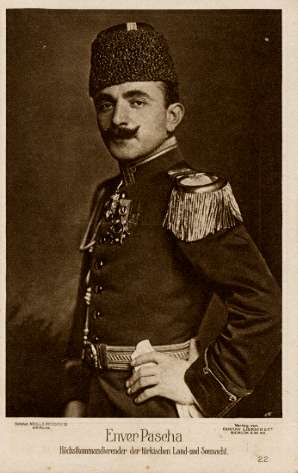
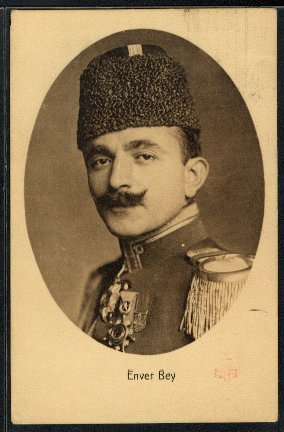

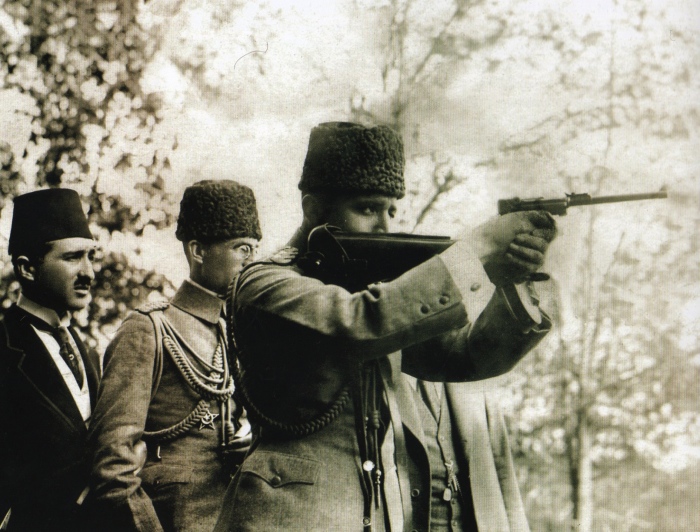
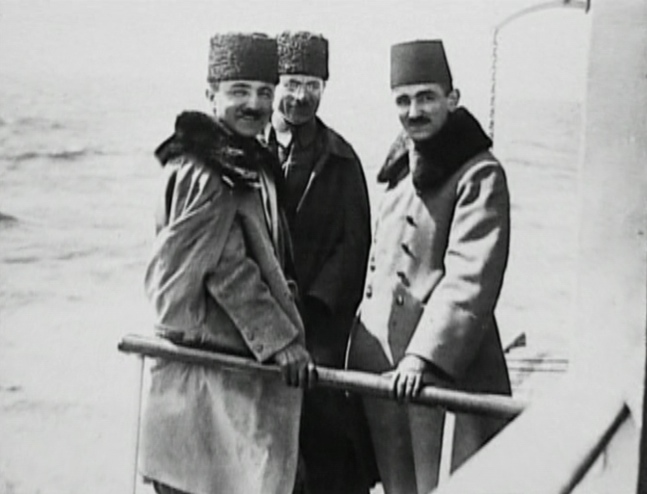




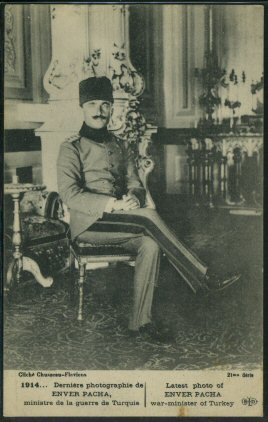

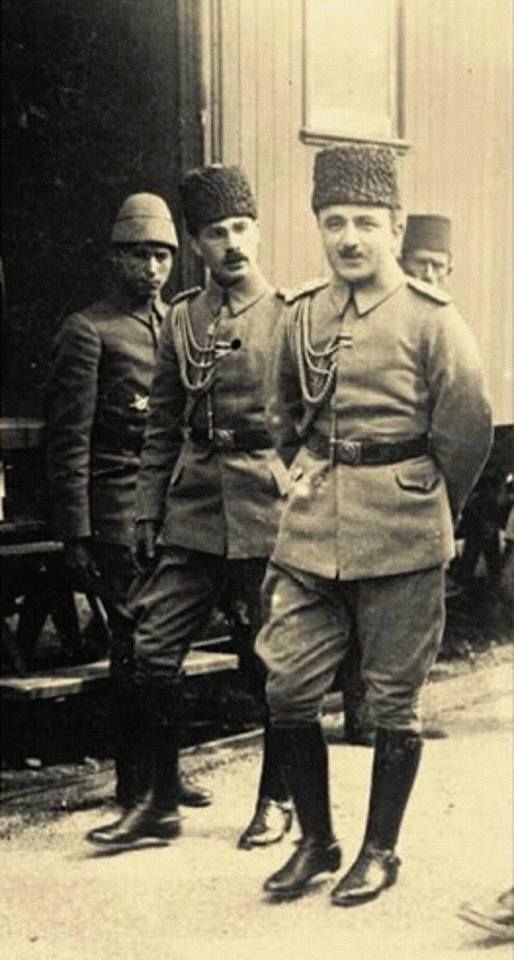

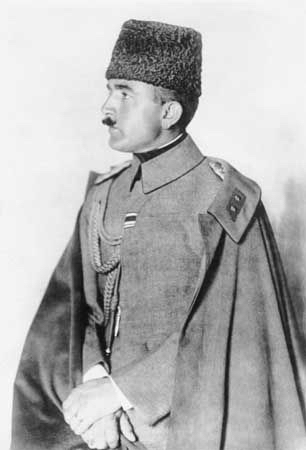
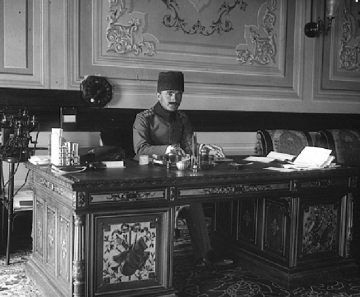
Enver Pasha’s message to the army and the people was “war until final victory”. However the living conditions were deteriorating rapidly in the country and there was a growing discontent. When the Russians withdrew from the war after the Bolshevik Revolution, there were some hopes to turn the tide in the war and the Turkish troops even entered Azerbaijan and Iran, capturing Baku. For a moment, Enver Pasha seemed to be approaching his pan-Turkish ideals; however the meltdown in Palestine and Mesopotamia accelerated the end of the war for Turkey. In October 1918, when the Talat Pasha Cabinet resigned, Enver stepped down as the Minister of the War and later that month, the Armistice of Mudros was signed.
In the early hours of November 2, 1918, Enver Pasha left Turkey on board of a German submarine, together with other CUP leaders including Talat and Cemal. They disembarked in Crimea, from where Talat and Cemal traveled to Germany. Enver did not join them. He wanted to reach the Caucasus and establish contact with the Turkish army units commanded by Halil Pasha and Nuri Bey. He failed to do so, because the boat taking him to the Black Sea went aground. So, he went to Berlin instead.
In Germany, Enver Pasha contributed to the reorganization efforts of the CUP and established contact with where he had relations with German communist figures like Karl Radek. He tried to move to Moscow but he was arrested in Lithuania and after spending two months in prison he returned to Berlin. Meanwhile, on January 1, 1919, the new Turkish government expelled Enver Pasha from the Army. He was tried in absentia for crimes of “plunging the country into war without a legitimate reason, forced deportation of Armenians and leaving the country without permission” and sentenced to death.
Enver Pasha tried once again to go to Moscow, but this time his plane had to a forced landing in Latvia; he was arrested and imprisoned in Riga. Later he was freed and returned Berlin. His third attempt to reach Moscow, in August 1920, was successful. He was received well in Moscow where he had established contacts with representatives from Central Asia and his former comrades from the CUP. He also met with Bolshevik leaders including Vladimir Ilyich Lenin himself. He tried to support the resistance in Turkey and corresponded with Mustafa Kemal, giving him the guarantee that he did not intend to intervene in the movement in Anatolia.

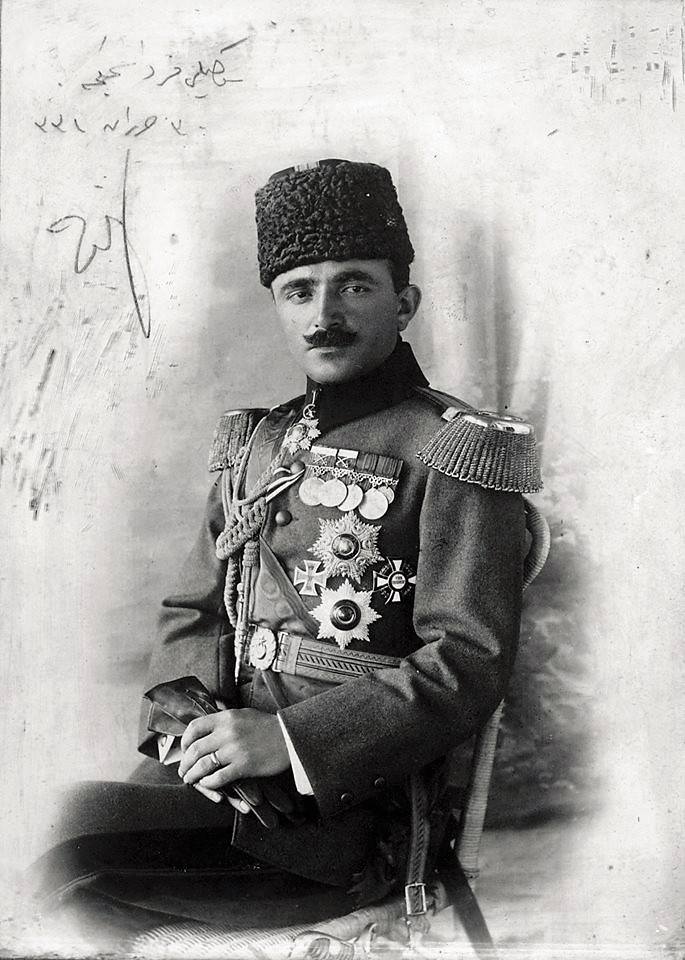

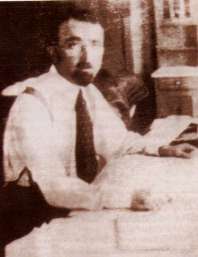

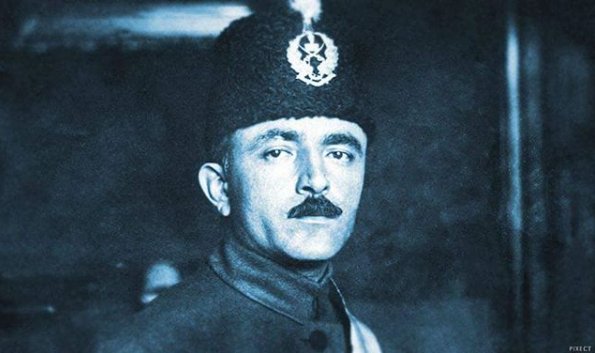

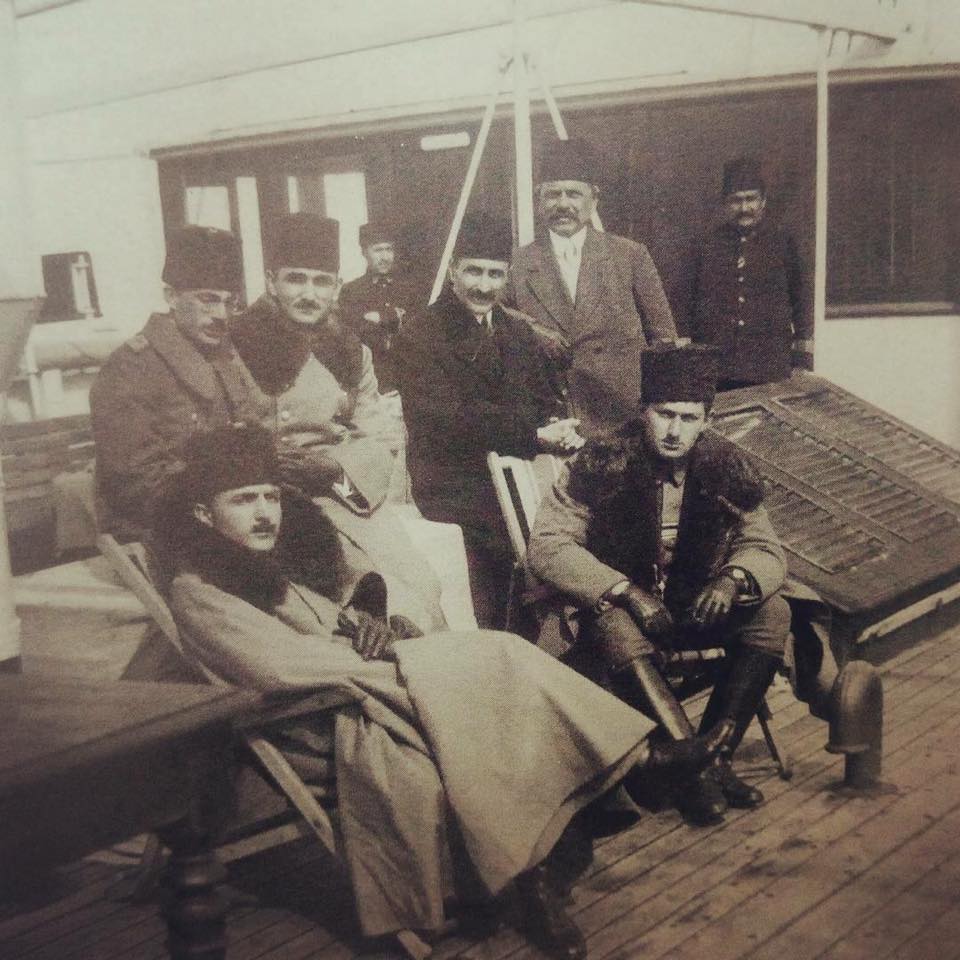
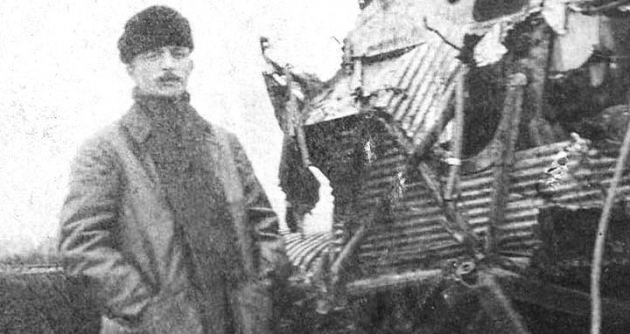


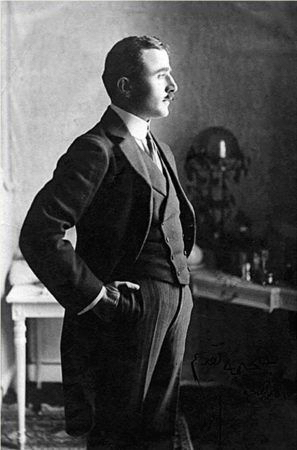
Enver Pasha went to Baku between September 1-8, 1920 to take part in the Congress of Eastern Peoples, representing Libya, Tunisia, Algeria and Morocco, but this congress did not produce the desired outcome. He later returned to Berlin where he tried to establish a secret organization that would transfer Russian military assistance to Turkey, an attempt that eventually failed.
On July 30, 1921 when the major Greek offensive towards Ankara began, Enver decided to return to his homeland and moved to Batumi, located close to the Turkish border. However, when he heard about the Turkish victory in Sakarya, he changed his plans and traveled to Central Asia to realize his pan-Turkish dreams. After stopovers in Tbilisi, Ashgabat and Merv, he arrived in Bukhara.
In February 1922, after a brief imprisonment by a local warlord, Enver Pasha went to the Dushanbe region, joined the Basmachi leaders, organized their forces and rose against his former supporters, the Bolsheviks. On August 4, 1922, as he was celebrating the religious feast at his headquarters near the village of Ab-ı Derya, Russians attacked. Enver Pasha, together with his thirty horsemen, tried to break the Russian assault near the Chegan Hill, which was a futile attempt. He was killed in action.
Enver Pasha was buried in the village of Ab-ı Derya in current-day Tajikistan. His grave stayed there for more than seven decades, before his remains were brought to Turkey and reburied in Istanbul in 1996.
![]()
